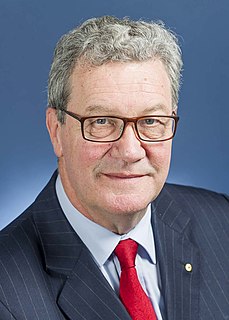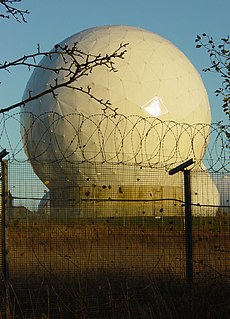The Intelligence Services Act 2001 (ISA) is an Act of the Parliament of Australia, which made significant changes to the Australian Intelligence Community (AIC). The bill was introduced into Parliament on 27 June 2001 [1] by then Minister for Foreign Affairs Alexander Downer. The Act was passed by Parliament on 29 September 2001 and came into effect on 29 October 2001.

The Parliament of Australia is the legislative branch of the government of Australia. It consists of three elements: the Crown, the Senate and the House of Representatives. The combination of two elected chambers, in which the members of the Senate represent the states and territories while the members of the House represent electoral divisions according to population, is modelled on the United States Congress. Through both chambers, however, there is a fused executive, drawn from the Westminster system.
The Australian Intelligence Community (AIC) and the National Intelligence Community (NIC) or National Security Community of the Australian Government are the collectives of statutory intelligence agencies, policy departments, and other government agencies concerned with protecting and advancing the national security and national interests of the Commonwealth of Australia. The intelligence and security agencies of the Australian Government have evolved since the Second World War and the Cold War and saw transformation and expansion during the Global War on Terrorism in response to current international and domestic security issues such as terrorism, violent extremism, cybersecurity, transnational crime, counter-proliferation, support to military operations, and Pacific regional instability.

Alexander John Gosse Downer AC is a former Australian politician and diplomat who was leader of the Liberal Party from 1994 to 1995, Minister for Foreign Affairs from 1996 to 2007, and High Commissioner to the United Kingdom from 2014 to 2018.
Contents
The Act introduced three main reforms:
- it provided a statutory basis for the Australian Secret Intelligence Service (ASIS) and the Australian Signals Directorate (at the time called the Defence Signals Directorate, DSD), both of which had been previously established by and operated under executive order.
- increased powers for the Australian Security Intelligence Organisation (ASIO), ASIS and DSD.
- established the Parliamentary Joint Committee on ASIO, ASIS and DSD to replace the former Parliamentary Joint Committee on ASIO (which was established in 1988) and the Joint Select Committee on the Intelligence Services. The Committee was appointed in March 2002. The Committee's purview was expanded from 1 July 2004 to include DIO, DIGO and ONA, following the recommendations of the Flood Inquiry. On 2 December 2005, the name of the Committee was changed to the Parliamentary Joint Committee on Intelligence and Security (PJCIS).

The Australian Secret Intelligence Service is Australia's foreign intelligence agency. ASIS was formed in 1952, but its existence remained secret even within the Government until 1972. ASIS is part of the Australian Intelligence Community responsible for the collection of foreign intelligence, including both counter-intelligence and liaising with the intelligence agencies of other countries. In these roles, ASIS is comparable to the British Secret Intelligence Service (MI6), Canada's Canadian Security Intelligence Service (CSIS) and the American Central Intelligence Agency (CIA).

Australian Signals Directorate is the Australian government agency responsible for foreign signals intelligence, support to military operations, cyber warfare, and information security. ASD is part of the Australian Intelligence Community. ASD's role within UKUSA Agreement is to monitor SIGINT in South and East Asia. The ASD also houses the Australian Cyber Security Centre.
The Australian Security Intelligence Organisation is Australia's national security agency responsible for the protection of the country and its citizens from espionage, sabotage, acts of foreign interference, politically motivated violence, attacks on the Australian defence system, and terrorism. ASIO is comparable with the British Security Service (MI5) and the United States Federal Bureau of Investigation (FBI). ASIO is part of the Australian Intelligence Community.


